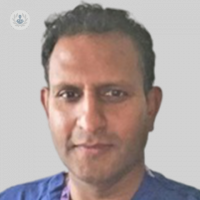How are inguinal hernias treated?
Written in association with:Top Doctors recently spoke to distinguished consultant general, vascular, and paediatric surgeon, Mr Rame Sunthareswaran. In this article, the revered doctor explains what an inguinal hernia is, outlines the related symptoms, and details how they are treated.

What is an inguinal hernia?
An inguinal hernia is a hernia whereby a small piece of the intestine or other abdominal tissue protrudes through a weak spot in the patient's lower abdominal wall. This can either happen naturally or as a result of injury or strain.
What are the symptoms of inguinal hernias, and how can they affect a patient's quality of life?
There are quite a number of symptoms associated with inguinal hernias. The main ones are a bulging or lump in the groin area, pain or discomfort in the groin, and pressure in the area. Hernias can also cause a dragging or aching sensation in one's groin, and can also lead to difficulty standing or lifting heavy objects.
How are hernias in the groin treated?
When it comes to treating inguinal hernias, surgery is often performed. This surgery is known as a herniorrhaphy and is carried out in order to push the protruding tissue back into the abdominal cavity and repair the weak spot in the abdominal wall.
What might potentially happen if inguinal hernias are ignored?
If one's inguinal hernia is ignored, the protruding tissue can become trapped or strangulated, which can cause severe pain, nausea, vomiting, and fever. Dangerously, strangulation can also cause the blood supply to the trapped tissue to be cut off, leading to tissue death and infection, which requires urgent medical treatment.
Is it possible for small groin hernias to go untreated?
Small inguinal hernias may not cause any symptoms and may not require treatment.
Mr Rame Sunthareswaran is a highly revered consultant general, vascular, and paediatric surgeon who specialises in performing surgery to treat inguinal hernias. Make sure you book an appointment with him today via his Top Doctors profile if you require inguinal hernia treatment.


